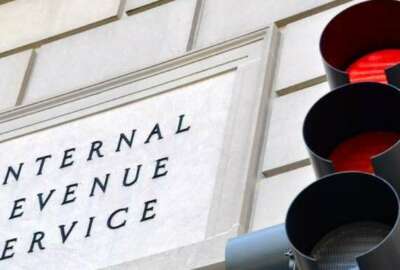Agencies aren’t always capable of investigating their own whistleblower complaints
Bob Tobias, a professor in the Key Executive Leadership Program at American University, has looked into this question.
Best listening experience is on Chrome, Firefox or Safari. Subscribe to Federal Drive’s daily audio interviews on Apple Podcasts or PodcastOne.
Federal employee whistleblower complaints are often investigated by the agency itself, rather than by the Office of Special Counsel. This can speed up resolutions or end up with complaints going nowhere or even suppressed. Bob Tobias, a professor in the Key Executive Leadership Program at American University, has looked into this question. He joined the Federal Drive with Tom Temin with some perspective.
Interview transcript:
Tom Temin: And, Bob, it seems that there is no one perfect way to deal with whistleblowers but having the agency do it internally doesn’t always work out, does it?
Bob Tobias: It does not. Former President Trump in 2017 argued in an executive order that the Department of Veteran Affairs should be allowed to investigate the whistleblower complaints internally, in the interest of resolving them faster and more efficiently. And then the executive order was later turned into a statute. But that approach, I think, runs into the real challenge of what it means to investigate internally. Because what it requires is a focused attention and support a political appointees who are willing to hear bad news, see bad news published in newspapers and on social media, accept responsibility for the bad news, and then take action to turn the bad news to good news.
Tom Temin: But let me just ask this: In some agencies, it is the inspector general’s office that looks at whistleblower complaints. And we’ve seen that even at VA, and so therefore, you do have some independence there. And the inspector general doesn’t care if the news is bad.
Bob Tobias: Well, yes, theoretically, Tom, but when we do have a recent evidence of the [Department of Homeland Security] inspector general, who suppressed over 10,000 DHS employee sexual assault complaints, and when it was discovered, Secretary [Alejandro] Mayorkas created a new, centralized process for processing employee complaints. But I ask in the long term, will that work because maybe the next secretary of DHS will use the idea of centralized decision-making to suppress those complaints in the future?
Tom Temin: Right, so then having an external body like the Office of Special Counsel, you run into the issue of just sheer workload, sheer time it takes and as we’ve seen so many adjudicative types, or investigative types of processes by federal agencies internally or externally just take so long.
Bob Tobias: Well, I think the answer to that, Tom, is to beef up the Office of Special Counsel, rather than to depend on the long term, on political appointees meeting that high bar of allowing themselves to look bad. While there may be individual political appointees who accept responsibility for the failure of those they lead, and more importantly, for their own failures, we can’t depend on every political appointee over the long term, to meet that bar.
Tom Temin: We’re speaking with Bob Tobias, professor in the Key Executive Leadership Program at American University. And I guess it’s understandable why some politicals would want to avoid this. There was a administrator of the GSA a number of years ago, I think, early in the Obama administration, and I remember the scandal of the expensive Las Vegas conferences that GSA was doing. And it was a scandal. And you had a crooked bunch running this thing, and taking junkets paid for out to Las Vegas to check the venue, three or four times. And there was the famous picture of the guy with the wine glass in the bathtub and all of this. But it was the administrator that took the fall, even though this all occurred entirely before she even arrived at the agency. And so her career was sullied and her reputation to some degree, even though she had literally nothing to do with it.
Bob Tobias: Well, that’s true. Because what can happen in that kind of a situation is a culture of noncompliance can develop. And in a culture of noncompliance, the people in charge suppress any complaints and continue to behave as you just described. So in my view, the only way of managing and as in the case, you pointed out, someone who was innocent, but took the hit is to encourage an outside investigative authority like the Office of Special Counsel to do its work, but do it faster.
Tom Temin: Right, because really, it was not fair for this person to take the hit for that and she exposed it and said, we really made a big mistake here. Which was gracious of her but it really wasn’t that person’s mistake. And so that, again, you’re saying mitigates in favor of external look at these events entirely.
Bob Tobias: I think so, Tom, I think so. There isn’t any evidence anywhere over the long term of successful looking internally at oneself by political appointees, finding fault and fixing that fault.
Tom Temin: But I want to get back to the inspector general question because, yes, IG’s are also politically appointed. But their purpose in life is to have this external, or at least objective, outside-of-the-agency chain of command view of things, no matter how bad they might be. So why can’t IG’s step up more here?
Bob Tobias: They can, and they should. But it only provides for me proof of the fact that no, we can’t depend on every political appointee to be fault free. And the only way we can make sure that it doesn’t occur is to have, not only is to have the Office of Special Counsel be able to investigate problems in IG offices as well.
Tom Temin: Well, that question I think is probably going to be resolved not for quite a while because the whistleblower complaints come in. And I think this is going to be something we were going to deal with for a while.
Bob Tobias: Well, I think it is. But I think it’s also true that when you have a over-2-million-person workforce, there are going to be people who fail to follow the laws, rules and regulations, to make sure that these complaints get surfaced and an employee’s career is not damaged for surfacing these problems.
Tom Temin: All right, Bob Tobias is a professor in the Key Executive Leadership Program at American University. Thanks so much.
Bob Tobias: Thank you, Tom.
Copyright © 2025 Federal News Network. All rights reserved. This website is not intended for users located within the European Economic Area.
Tom Temin is host of the Federal Drive and has been providing insight on federal technology and management issues for more than 30 years.
Follow @tteminWFED






